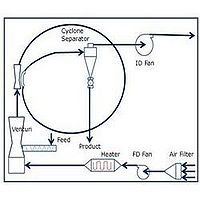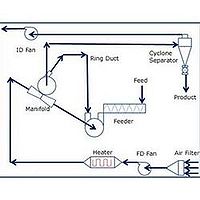Difference between revisions of "Ring Dryers"
| Line 6: | Line 6: | ||
* -------------------------------------------------></noinclude> | * -------------------------------------------------></noinclude> | ||
Normally in Industry there are 2 major types of '''Ring Dryers''' are widely used. These are: | Normally in Industry there are 2 major types of '''Ring Dryers''' are widely used. These are: | ||
* P Type Ring Dryer | * P Type Ring Dryer | ||
* Full Ring Dryer | * Full Ring Dryer | ||
==P Type Ring Dryer== | ==P Type Ring Dryer== | ||
[[File: | [[File:P_Type_Ring_Dryers.jpg|thumb|right|200px|P Type Ring Dryers]] | ||
It provides for the extended residence time required for products such as modified starches and some polymer materials. P-type Ring Dryer is used for heat sensitive materials. In this configuration, the semi-dried particles discharged from the manifold are exposed to the outlet temperature level. | It provides for the extended residence time required for products such as modified starches and some polymer materials. P-type Ring Dryer is used for heat sensitive materials. In this configuration, the semi-dried particles discharged from the manifold are exposed to the outlet temperature level. | ||
==Full Ring Dryer== | ==Full Ring Dryer== | ||
[[File: | [[File:Full_Ring_Dryers.jpg|thumb|right|200px|Full Ring Dryers]] | ||
It can be used for thermally stable products such as zeolites, silica, and precipitated calcium carbonate. | It can be used for thermally stable products such as zeolites, silica, and precipitated calcium carbonate. | ||
The Full Ring Dryer exposes the recirculated coarse particles to the inlet temperature level; the diagram demonstrates incorporation of a disintegrator. This type of dryer incorporates a centrifugal classifier (manifold) in the flash dryer loop. The manifold consists of a series of adjustable deflector blades which control the recirculation within the dryer. The manifold provides selective classification of the larger, wetter particles back to the drying duct extending The residence time. In addition, the manifold results in lower product moisture using lower outlet temperature than in a simple flash dryer. | The Full Ring Dryer exposes the recirculated coarse particles to the inlet temperature level; the diagram demonstrates incorporation of a disintegrator. This type of dryer incorporates a centrifugal classifier (manifold) in the flash dryer loop. The manifold consists of a series of adjustable deflector blades which control the recirculation within the dryer. The manifold provides selective classification of the larger, wetter particles back to the drying duct extending The residence time. In addition, the manifold results in lower product moisture using lower outlet temperature than in a simple flash dryer. | ||
Latest revision as of 12:02, 30 July 2012
Normally in Industry there are 2 major types of Ring Dryers are widely used. These are:
- P Type Ring Dryer
- Full Ring Dryer
P Type Ring Dryer
It provides for the extended residence time required for products such as modified starches and some polymer materials. P-type Ring Dryer is used for heat sensitive materials. In this configuration, the semi-dried particles discharged from the manifold are exposed to the outlet temperature level.
Full Ring Dryer
It can be used for thermally stable products such as zeolites, silica, and precipitated calcium carbonate.
The Full Ring Dryer exposes the recirculated coarse particles to the inlet temperature level; the diagram demonstrates incorporation of a disintegrator. This type of dryer incorporates a centrifugal classifier (manifold) in the flash dryer loop. The manifold consists of a series of adjustable deflector blades which control the recirculation within the dryer. The manifold provides selective classification of the larger, wetter particles back to the drying duct extending The residence time. In addition, the manifold results in lower product moisture using lower outlet temperature than in a simple flash dryer.

